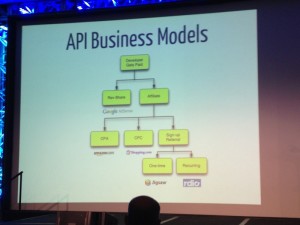June 19th, 2014 by Elma Jane
API Software Inc. has created an application ISOs can use to help merchants tabulate the best payment services deals. The Square Deal Pro app for the merchant services industry enables sales reps to compare their company’s rates to those of Square, PayPal, Stripe and other payments aggregators. Essentially, the application takes the mathematics burden off of the merchant and helps an ISO or agent compare bundled pricing with interchange-plus pricing.
Frank Haggar, a software developer, started asking merchants why they chose a certain provider and they just said the pricing was simpler. It might be more expensive, but it was easier for them to understand. That moved to develop Square Deal Pro. It’s a software that salespeople can have right on their phones and it makes a comparison and is easy to understand. Square Deal Pro, which operates on iPhones, Android devices and Windows phones, was established as a vendor-neutral tool that is also available for merchants to download if they were inclined to want to crunch numbers themselves. Service providers pay for the application and all of its sales features, but a free version for price comparisons only is available to merchants.
Merchants are experts in what they know how to do and they may not want something that includes math distracting them from that, but the sales rep can do it for them and use it along the lines of a calculator helping someone figure out mortgage rates. ISOs have various tools at their disposal and lock in key information in their brains to prepare for sales presentations, but most will likely find Square Deal Pro a valuable addition. Something that takes complicated pricing schemes and factors it all into an easy interface that puts out a clear comparison that is valuable, certainly out in the field.
API Software has to deliver something difficult or impossible to copy because that would set this permanently apart as opposed to being a lead to other similar products in the market. An ISO can change rates or make adjustments for a client if the numbers show that another provider is offering a less expensive option, but the numbers in the app don’t lie. The app will show how a bundled rate can work in your favor, such as if you are selling Girl Scouts cookies at $3 a box. Then use Square all day long, but an ISO can compare how his product works compared to others and the app can show, that at a certain time, it might be beneficial to switch over.
Square Deal Pro takes into account factors other than interchange rates, including merchant volume, average ticket price and whether transactions are keyed or swiped or both. All of those things determine where you fit in on the diagram of how your rate should be structured. There is a lot of analysis on minimal focal points. The application may also help defuse potential problems with merchants who sometimes feel their sales rep was not providing a fair assessment of pricing structure or comparisons.
As for the application’s name, Haggar doesn’t want any confusion over whether this might be a new Square product.
Posted in Best Practices for Merchants Tagged with: account, aggregators, Android, assessment, bundled pricing, developer, devices, interchange, interchange rates, interchange-plus pricing, iPhones, ISOs, market, merchant services, merchant volume, Merchant's, mortgage rates, payment, PayPal, phones, pricing, Pro app, products, provider, Rates, sales, Service providers, software, Square, Square Deal Pro app, Stripe, transactions, Windows phones
August 16th, 2013 by Admin
Facebook is doing early testing of a payment system to store credit card data and processes transactions through PayPal or other merchant service providers including Stripe or Braintree. Facebook would store credit card data for use in purchases in Facebook Gifts and games played on Facebook. The thought behind the move being that it makes it easier for people to make mobile transactions on third party apps giving strength to their advertising platform.
In a statement, Facebook said…
“We are working on a very small test that gives people the option to use their payment information already stored on Facebook to populate the payment form when they make a purchase in a mobile app. The app then processes and completes the payment. The test is designed to make it easier and faster for people to make a purchase in a mobile app by simply pre-populating your payment information. It will be a very small test with 1-2 partners. Additionally, this test does not involve moving the payment processing away from an app’s current payments provider, such as Paypal. We continue to have a great relationship with our payment processing partners, and this product is simply to test how we can help apps provide a simpler commerce experience.”
This marks a bold move whether or not Facebook is actually conducting the transaction itself. Higher conversion rates on their advertising for app developers and advertisers. Mobile Wallets have a proven success for the likes of Amazon, Apple and Google where repeat transactions are the norm. The move could signal that Facebook is looking to move further into e-commerce and digital transaction payments and to buy or build their own payment processing division. It’s also a signal that digital identity and verification could be on the horizon.
Combined with the data Facebook already knows about its users, the company could store things like clothing sizes, shoe sizes, travel itineraries, music or event preferences and much more. This could be a catalyst to send that data automatically to vendors at the point of sale. Things like email addresses are already shared to third party apps if you allow them to. Loyalty rewards might be offered to users to allow the data to be shared with vendors for deeper demographic information.
In addition to mobile payments, Facebook has experimented with virtual currency transactions with its Facebook Credits initiative. They exited the strategy because mostly because developers moved to other virtual currencies like BitCoin and LiteCoin. Recently Facebook Gifts lets users send one another physical gifts and presents a gift suggestion when it notifies users of a birthday. Pulling down the barrier and simplifying a complicated transaction could make it a boon to retailers looking toward mobile payment processing.
Posted in Digital Wallet Privacy, Electronic Payments, Mobile Payments, Mobile Point of Sale Tagged with: digital, electronic, Faceboo, mobile payment, mobile wallet, PayPal, Stripe

